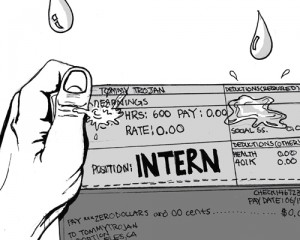Whistle-blower program needed for internships
A Federal District Court judge in Manhattan ruled last Tuesday that Fox Searchlight Pictures had violated federal law by not paying production interns on the set of Black Swan. Judge William H. Pauley III said that the two interns in question practically worked as regular employees. Furthermore, the studio failed to facilitate an educational environment and reaped the benefits of the interns’ work, all of which violated the Department of Labor’s criteria for unpaid internships.
Cases such as this one illustrate the need for a solution to the rarely policed exploitation of unpaid interns. Increased regulation, however, is not enough. More attention should be given to a better whistle-blower program for victims.
The Fair Labor Standards Act is clear about what provisions an internship must satisfy in order for it to qualify as a proper unpaid internship. The position must be in an educational environment and of benefit to the intern. Unpaid interns must work in close supervision, not displace any regular employees and isn’t promised a job at the end of the internship. In addition, the intern’s work must not be of immediate advantage to the employer and it might even hinder the employer.
Unfortunately, the criteria are hard to enforce and it places the burden on interns to report illegal unpaid internships. This grand notion fails because interns often fear that pursuing legal action against employers would hurt their chances of employment in the future. As such, the problem isn’t so much that there’s a lack of regulation, but that interns should have a better way to report illegal unpaid internships without fear of retribution.
The matter is complicated by the rising popularity of businesses offering college credit in lieu of payment. This kind of compensation limits the position and experience to those who are financially capable to dish out unit tuition. The undergraduate unit tuition rate at USC for this summer is $1,473, according to the USC Schedule of Classes. Low-income students can therefore lose out on much-needed experience, which further escalates the level of inequality in the workplace.
Employers often use credit as a reason to not compensate their interns; colleges in turn receive tuition money for summer courses.
The whole system, while intended to protect students from exploitation, is broken, and students are left to endure their financial losses and work basically for free — all in the name of “educational” purpose. Furthermore, federal regulations state that while college credit is a form of compensation, if the internship has little training and the work largely benefits the business, then the intern remains entitled to other forms of compensation.
Interns that do wish to brave the process and file a complaint face greater obstacles than regular employees. Kathyrn Edwards, a researcher at the Economic Policy Institute and co-author of a new study on internships, told The New York Times that because unpaid interns are not considered employees, they are not protected by employment discrimination laws.
Companies that decide to accept interns need to commit themselves to providing a productive work environment. Students should foster such change by actively disseminating feedback about their experiences, something that has gradually started through websites like internshipratings.com. And the issue is gaining more attention as the number of bad experiences at unpaid internships proliferates.
Nonprofit newsroom ProPublica caught sight of this issue surrounding the rising intern economy and launched a Kickstarter to fund an investigation. It hopes to raise $22,000 by next Wednesday to investigate the lack of protection interns — especially those who are unpaid — are receiving today. Based on largely anecdotal evidence alone, it appears ProPublica will have plenty to investigate.
“I don’t feel like I walked away with anything useful or something that I can apply to other jobs. It was mostly busy work,” said a’12 alumnus Jason Termechi to the Summer Trojan about his internship experience at an entertainment agency.
While students scramble to land a position to add to their resume, students must remain careful when applying for internships. They should keep in mind that the job descriptions can be a façade, and that employers can often give them too small or too big of a task. Taking up unpaid internships should be approached with extra caution.
It takes courage to stand up to one’s boss, but if unpaid interns feel that they’re expected to work as much as full-time employers do, they should feel that they have every right to express their concerns to their employer or the Department of Labor.
But the best way to facilitate a more open culture surrounding unpaid internships is to increase awareness of interns’ options when faced with improper unpaid internships. This country needs a streamlined program for whistle-blowers to efficiently submit complaints without the need to go to court or fear potential retribution, because not everybody can afford to sue their employers.
Shoko Oda is a junior majoring in international relations and East Asian studies .

